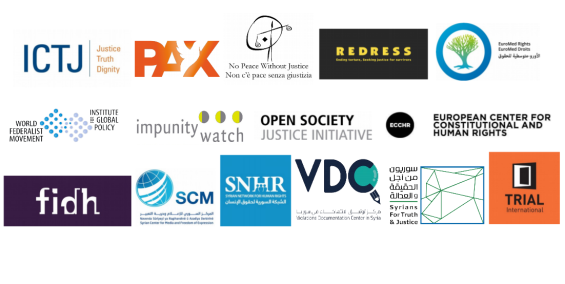Ahead of the 24-25 April “Brussels II Conference”, FIDH, its league SCM (Syrian Center for Media and Freedom of Expression) and several international and Syrian NGOs (including No peace Without Justice) call on the European Union and the United Nations to ensure that accountability for atrocities in Syria and justice for victims be integrated as a central concern of the discussions on the “future of Syria”.
Subject: Accountability, redress, and the future of Syria
Dear United Nations Secretary-General,
Dear High Representative of the European Union for Foreign Affairs and Security Policy,
Dear Commissioner for Humanitarian Aid and Crisis Management,
Dear Commissioner for Enlargement and European Neighbourhood Policy,
Dear Commissioner for International Cooperation and Development,
Dear Political and Security Committee Ambassadors,
Ahead of the 24-25 April “Brussels II Conference”, the undersigned international and Syrian Non Governmental Organisations call on the European Union and the United Nations to ensure that accountability for atrocities in Syria and justice for victims be integrated as a central concern of the discussions on the “future of Syria”.
Seven years into the conflict, the near total absence of accountability for grave violations of human rights and humanitarian law and of redress for victims have further entrenched the culture of impunity that arose over decades of repression in Syria. This impunity is one of the root causes of the conflict. Any conference to discuss the country’s future must not brush aside the question of accountability for crimes committed in Syria.
Impunity is affecting all Syrians inside and outside of Syria and will have severe long-term consequences if not addressed urgently. Impunity for past and present crimes gives a blank check to perpetrators and abusers to continue committing serious human rights violations and violations of international humanitarian law, and threatens to undermine popular trust in any judicial system reconstructed from its repressive forebears. Feelings of injustice and the absence of redress will result in frustration and in a fertile soil for extremism; they will prevent the rehabilitation of victims and the restoration of trust and confidence in new state institutions and in the rule of law.
Furthermore, the sense of persistent injustice that accompanies total impunity will prevent Syrians who have fled their country from voluntarily returning.
The UN General Assembly’s creation of the International, Impartial and Independent Mechanism for Syria mandated to collect and analyse evidence of crimes for the prosecution of those responsible for the most serious crimes is an important step towards combating impunity for grave violations of international law and towards accountability. Likewise, ongoing investigations and proceedings before national justice systems in some European Union member states, including those based on universal jurisdiction, have provided a much-needed source of hope for accountability and justice in the absence of more comprehensive solutions.
Much more must be done to overcome impunity and bring justice to victims for the overwhelming magnitude of atrocity over the past seven years. Criminal accountability and other transitional justice measures must be an integral part of peace discussions. More must be done to protect and support victims, whose voices and interests should be at the core of justice and accountability efforts. More must be done to support Syrian civil society organisations engaged in documenting crimes, engaging with victim communities, participating in peace negotiations, and working to build a peaceful Syria on a foundation of justice.
While the UN-led political process has a major role to play in this area, funding efforts discussed during the Brussels II Conference should also integrate these objectives. In addition to the essential areas of economic development, social integration, and support for youth and education, any planning for Syria’s future must incorporate justice and upholding victims’ rights as a central element.
Concretely, our organisations call on the European Union and United Nations to ensure that:
- the Brussels II Conference includes a meaningful discussion of the issues related to accountability and justice, both in the 24 April thematic discussions and the 25 April ministerial meeting;
- discussions during the 24 April thematic part of the Conference be held in presence of all relevant stakeholders, including Ministers and UN representatives;
- a clear process be identified to transmit the results of these thematic discussions and those of possible side events on accountability into the Ministerial discussions on 25 April; and that
- the Brussels II Conference final conclusions integrate the recommendations that will be made in the area of accountability and redress for victims, and that immediate action be made in order to translate them into concrete actions during the implementation phase of the pledges.
Looking forward to your reply, we remain at your disposal for further information.
List of signatories:
- Euromed Rights
- European Centre for Constitutional and Human Rights (ECCHR)
- Impunity Watch
- International Center for Transitional Justice (ICTJ)
- International Federation for Human Rights (FIDH)
- No Peace Without Justice (NPWJ)
- Open Society Justice Initiative (OSJI)
- PAX
- REDRESS
- Syrian Center for Media and Freedom of Expression (SCM)
- Syrian Network for Human Rights (SNHR)
- Syrians for Truth and Justice (STJ)
- TRIAL International
- Violations Documentation Center in Syria (VDC)
- World Federalist Movement-Institute for Global Policy




